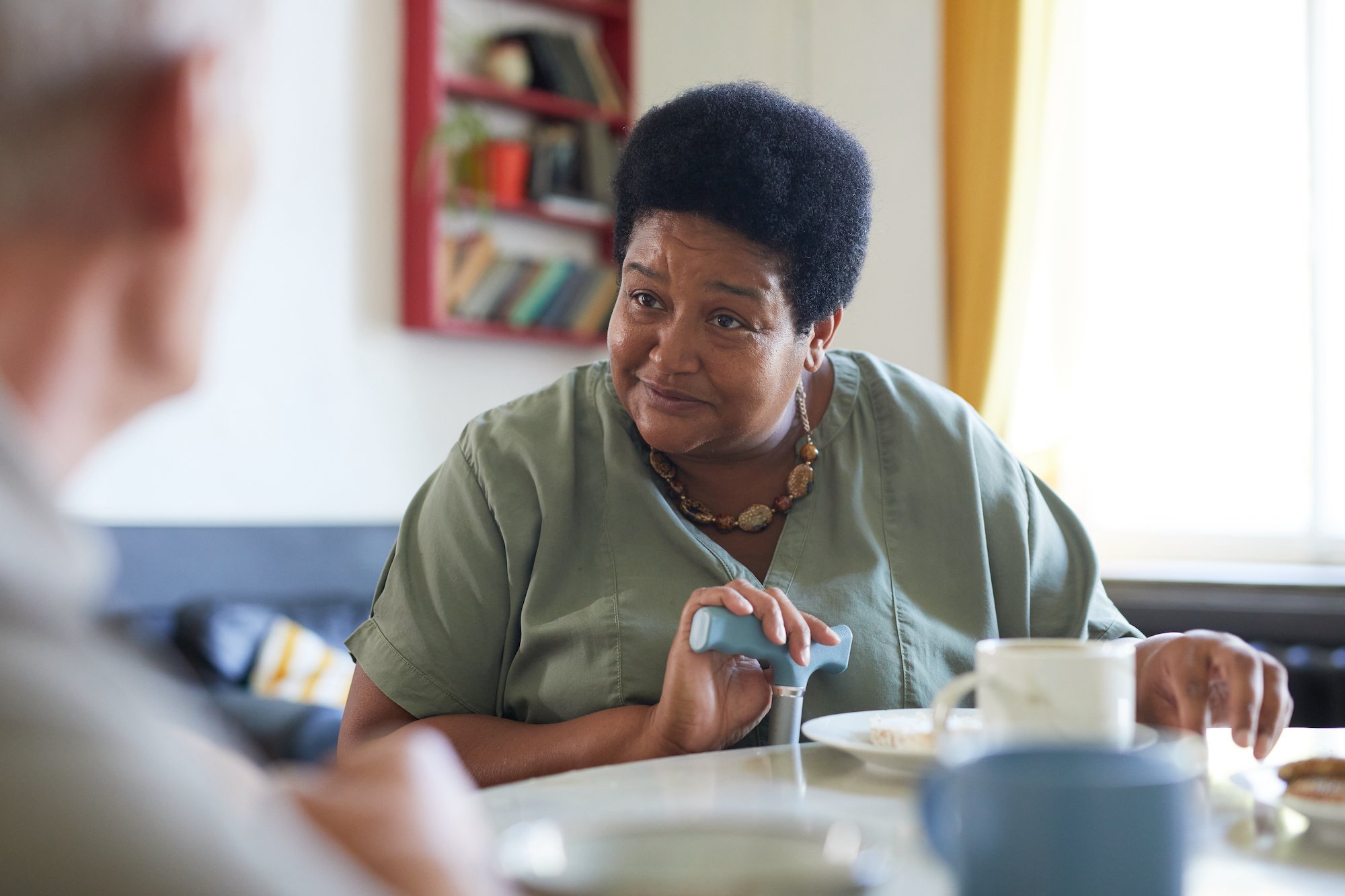Middle stage Alzheimer’s | living with and caring for symptoms
Tags
Alzheimers care
The middle stage of Alzheimer’s disease is when symptoms become more obvious than in early-stage Alzheimer’s. A person is likely to need more help with daily tasks, as well as prompts or gentle coaxing to keep them on track. For example, they may forget or refuse to shower, or struggle to dress appropriately for the weather. It’s also usually the longest stage of the condition.
At this stage, some daily activities can become taxing for the person with Alzheimer’s. For family carers, the middle stages can spell the start of frequent personal care requirements.
This mid-stage is all about being adaptable, calm and patient with increasingly difficult circumstances. If you’re looking after a loved one, you may start to notice individual quirks related to their cognitive decline and may develop strategies to cope. It’s often the point where families begin to think about professional help from a visiting or live-in carer to support everyone’s quality of life.
Managing middle-stage Alzheimer’s symptoms
The specific symptoms at each stage of the disease vary from one person to the next. However below is an overview of some of the symptoms you may experience, and some actions which may make daily life a little easier.
Decline in memory
Forgetfulness that was present in the early stages may worsen as the condition moves into the middle stage. For some people, this means forgetting the names of familiar objects, for others, it can become harder to recognise family and friends or recall significant past events.
As a family member or caregiver, witnessing a loved one struggle with memory loss can be really difficult. However, there are some strategies that may help both you and your loved one face these challenging situations –
- Stay calm – while it may be upsetting, especially if a loved one has called you a different name, it’s important to remember this isn’t intentional and respond in a calm voice, with a gentle correction or explanation.
- Use visual aids as reminders of relationships and important places – this may include photos, letters, or sentimental items, such as a wedding ring.
Pam Schweitzer, MBE on the power of reminiscence
One of the leading experts in the field of reminiscence therapy for over 30 years, Pam Schweitzer MBE is passionate about the positive effects of this work on older people and those with Alzheimer’s– focusing on triggering individual memories and the sharing of stories in reminiscence groups. We spoke to Pam about her work andMood swings and changes in behaviour
People with dementia don’t just experience memory problems. It’s also likely you’ll notice an impact on their emotions. Particularly as the disease progresses, it’s likely you may begin to notice mood swings – such as your loved one becoming increasingly confused or withdrawn.
behaviour changes may also include becoming agitated and unable to stay still, shouting, or repeating certain actions or asking the same question over and over.
For some, emotional challenges are particularly severe at night. ‘Sundowning’ often means people get disorientated and distressed about the change from day to night.
- Assess their safety – If they’re unable to calm down or are acting aggressively towards you or others, it may be time to consult a professional by calling 111 or 999.
- Identify what the cause may be – Try to identify the underlying issues that are causing the mood swings – ruling out physical needs such as hunger or pain. Acknowledge the emotions being expressed.
- Focus on their feelings – Consider the person’s emotions – how are they acting, what’s their body language like? does this match up with the words they’re saying?
- Engage them – Try and engage your loved one with relaxing activities, hobbies and interests to shift their frame of mind.
- Avoid arguing – You don’t need to express your disagreement with an opinion or engage them in an argument.
- Take a break – if it’s safe to do so, even stepping out for a few minutes can help you recalibrate your response to the situation.
Experiencing delusions
Middle-stage dementia can be when people start believing things that aren’t true. These false beliefs can manifest in lots of different ways. For example, a person may feel like someone is watching them or is working against them, they may think someone is stealing their things, or that their partner is being unfaithful.
Delusions can happen when a person with dementia is unable to hold back or ‘moderate’ their intense or intrusive thoughts. These beliefs are often based on very little evidence / unfounded suspicions.
People in the middle stage of Alzheimer’s may also begin to experience hallucinations – i.e. seeing, hearing, smelling, or feeling things that aren’t there. Many people find hallucinations distressing or frightening, however, smelling the familiar perfume or hearing the kind voice of a lost loved one may actually be comforting to someone with dementia.
Supporting someone through delusions or hallucinations –
- If a loved one is accusing you or someone else of something, try to find what may have led them to think that way – encourage them to share their thoughts
- Remember that the delusion of hallucination is very real to them, so don’t try to correct them. Instead, offer reassurance and acknowledge how they’re feeling
- Gently offer an alternative explanation for what they believe has happened as another possibility for them to consider
- Avoid situations that may cause further distress. For example, if they think their cleaner is stealing from them, you may wish to request a different cleaner to visit for a short while. It’s a good idea to involve your loved one in these changes to ensure they feel listened to.
Disorientation
Disorientation can be characterised by a sense of mental confusion, and a loss of a sense of direction. This can be about the time of day, day of the week, and the week of the year, as well as where they are. You may also notice that they begin to wander during the night.
However, trouble with orientation may have more of an impact on their physical abilities. You may notice your loved one finds it increasingly difficult to maintain balance, as they struggle with depth perception. This can make it hard to walk upstairs, or through doorways.
Things that may help support someone experiencing disorientation –
- Encourage gentle exercise to strengthen their body and help coordination
- Keep a regular daily routine to help them identify the time of day
- Place signs around the home to help them find their way if they get lost or confused

Incontinence
An aspect of middle-stage Alzheimer’s that can be tough for family members, especially those caring for someone with dementia, can be toileting needs. Unfortunately, the degeneration of the brain impacts the muscle groups needed for going to the toilet, which can lead to decreased bladder or bowel control, or both.
Accidents can happen for a number of different reasons, including. –
- Not getting to the toilet in time due to limited mobility, or not reacting quickly enough to the sensation of needing to go
- Being unable to communicate that they need to go
- Being unable to find or recognise where a toilet is when out and about
- Being unable to accept they have a problem, or refusing help from others
This can be a difficult time for all involved, and it’s not easy to see a loved one in such a vulnerable situation. Some coping strategies that people use include –
- Watch for non-verbal or subtle cues that they may need to use the bathroom, such as fidgeting, over time you may recognise common triggers or cues
- Make the bathroom obvious – this could be by keeping the bathroom door open or painting it a contrasting colour, and placing signs with arrows and pictures around the home. It can help to lock any walk-in cupboards, or remove any waste paper bins which may be mistaken for the toilet too.
- Preserve dignity by reminding them that it’s just a bodily function, it can happen to anyone, and by not making a big deal about it.
- Work with them to give them as much privacy as possible when resolving the situation – this may mean allowing them to clean themselves up first, and only stepping in when asked. Or, helping with smaller gestures like fetching them some clean clothes.
Language and communication
Communication can become more difficult during mid-stage Alzheimer’s and can lead to social withdrawal or isolation. This is because the condition can make it more difficult to find the right words, follow a train of thought, or use words logically.
People may also rely on using the same words repeatedly, describing objects rather than using their names, or being to rely heavily on physical gestures instead of words. If bilingual, a person with dementia will often revert back to speaking their native language.
It’s important to remember that while you may need to adjust your communication style, being patient and willing to try can help you to continue to understand each other.
- Try including information upfront – for example ‘Hello Mother, it’s your son Jon’, can act as a prompt.
- Reduce distractions – It may be helpful to engage in one-on-one conversations, away from audio/visual distractions such as the radio, telephone, television
- Maintain eye contact – Keep your gaze fixed on your elderly relative to maintain their concentration on the conversation.
- Keep it simple – Speak slowly in a gentle tone, using simple language, and easy yes or no questions. Be sure to talk to your loved one like an adult, not a child.
- Listen closely to what they’re saying – Be patient and engage in their responses.
- Avoid arguing or correcting – If you’re unsure of something they’ve said, repeat it back to them. If you don’t agree with something, it may be best to let it be and look for meaning or reasons behind it.

Planning for the late stages of Alzheimer’s
It’s no surprise that late-stage Alzheimer’s will likely be the most challenging. While it can be hard to think about the future, putting plans in place early for mid-stage and late-stage Alzheimer’s care may help ease some of the emotional and practical strain.
- Research the changes you can expect to see in your loved one’s health and behaviour
- Learn what it means to be a caregiver – what kind of difficulties will you face? do you have the capacity or support network to handle this? Online forums and support groups are good resources for this.
- Seek out caregiving strategies, like those suggested above to help you feel prepared
- Don’t be afraid to ask for help from other family members, friends, or neighbours. This doesn’t always mean asking them to help with providing care, it could be helping with school pick-ups while you’re looking after a loved one, or preparing meals when you don’t have time to cook.
- Investigate care options. It can be difficult as a family member to keep up with a loved one’s needs and that’s ok. Care professional have built their specialist skills and experience over many years, and even if you only choose to employ some part-time help to begin with, it’s often an important step in protecting your own wellbeing.
Read more about dementia and Alzheimer’s

Dementia care – how do I pay for it?
Dementia Live-in Care: How Do I Pay for It? If your loved one is living with dementia, it can be difficult to work out

Types of dementia
Common types of dementia Every dementia journey is different, and not everyone will experience the same symptoms. However, understanding the different types of dementia

What are the signs of dementia in women?
Did you know women have a greater risk of developing dementia over their lifetime than men? 600,000+ women in the UK are currently living

Dementia and sundowning – advice for caregivers
Dementia care – what is sundowning? Sundowning – sometimes referred to as ‘late-day confusion’ – is a symptom that causes those living with dementia

Discrimination and dementia
Overcoming discrimination and stigma can be a huge challenge for those living with dementia. We’ve looked at some of the common situations where people

Recognising the signs of frailty in someone with dementia
By understanding and recognising frailty, you can help a person with dementia to access the right care, reduce the risk of ending up in